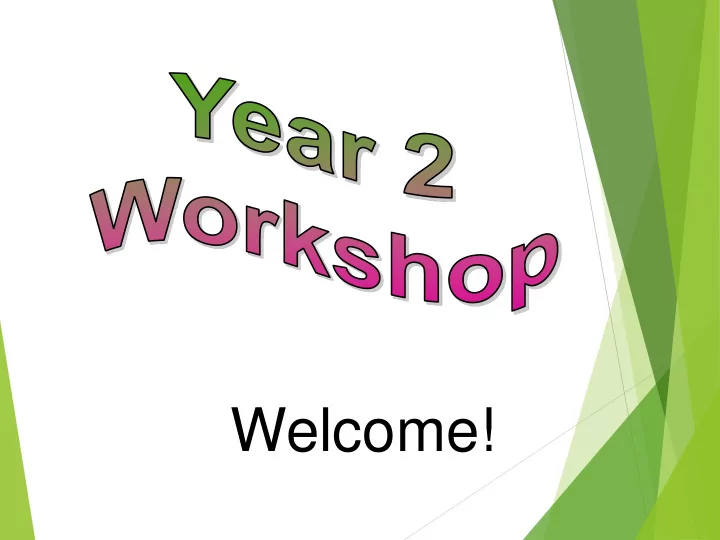

Welcome!
Aims of this workshop: Reading, Literacy and Numeracy expectations Writing: Handwriting, GPS examples and Writing expectations Reading: Decoding strategies and reading comprehension Numeracy: Numeracy assessments and strategies How can you help at home? Handouts
Handwriting (cursive script) Handwriting is a basic skill that influences the quality of work throughout the curriculum. Children start using the cursive style in Nursery and are taught to begin to join their letters from Year 1 onwards. We teach the children to understand the importance of clear presentation and take pride in their written work. All adults in school must write using cursive script as well! Please encourage your child to use joined handwriting at home. http://www.teachhandwriting.co.uk/
Grammar examples Put in the apostrophe to show possession. The man’s voice was deep. Write the contracted form. Remember to use an apostrophe . I did not - > I didn’t.
Writing involves a set of complex skills that will not develop without structured teaching and practice. In KAPS, the children learn different genres and read different examples of these genres. We also explore different writing styles and write our own texts, usually linked to their topics (for example, Theseus and the Minotaur for myths and legends, Little Pip for stories).
Non-Negotiables for Year 2 All sentences begin with a capital letter and end with a full stop, a question mark or an exclamation mark. Use inverted commas “ ”when someone is speaking. Use apostrophes for possession and for contraction. Capitals are never used in the middle of a word. Sound out unknown words to spell them. Use adjectives to describe nouns and adverbs to describe verbs. Start your sentences in different ways. Writing is always neat and cursive.
Writing: How can you help? Help your child practise their spellings and handwriting. Check the quality and quantity of their homework, making sure that they are using cursive script. Encourage your children to practise their writing skills. They can write about their interests, what they did on the weekend or their favourite sport. Play Literacy games. For example: Can you think of an adjective that begins with letter ‘d’? Write a word that has 3 syllables. Tell me a story using interesting sentence starters and time connectives. Encourage your child to explain to you what they have learnt at school each day.
Reading Children can change their books when needed. They are responsible for changing their own books. They do not need to finish one book every night – they are welcome to keep them for several nights! We ask that an adult signs their reading records so we know that they have read. If this is not possible, the child can sign it themselves and their class adult will ask questions about the book.
Reading KS1 Strategies are based on decoding and include: Sounding out new words. Splitting up longer words and blending the sounds. Using pictures as prompts. Saying the word and checking in your head whether it sounds right/makes sense (self-correction). KS1 strategies to help inference and understanding: Looking at the front cover and title: what do you think the story could be about? Can you describe what you can see? Using examples from the text to answer questions about what you have read. Summarising and retelling the story. Locating and explaining new vocabulary.
Reading: How can you help? Please make sure that your child reads every day for 20 minutes. Remember to sign your child’s Reading Record. Choose a quiet time/place and listen to your child read. Make their reading enjoyable: praise your child for effort, good reading, using expression, making links to previous stories, understanding of the text. Variety of books is important, e.g.: poetry, information books, fairy tales. If they mispronounce the word, please do not interrupt them immediately. Give them time to self correct. Talk about the books, including the pictures, characters, how the story will end, their favourite part etc. Variety of books is important, e.g.: poetry, information books, fairy tales. Check that your child understands the vocabulary.
Literacy: Handouts Year 1 and Year 2 Common Exception Words. First 100 High Frequency Words. Writing Non-Negotiables for Years 1 and 2. Reading worksheet.
Numeracy: Year 2 PAM Skills Checks on Friday followed by a test re-teach the following Friday. SAT Papers Arithmetic and Reasoning.
Non-Negotiables for Year 2 Read and write all numbers to 100 in digits and words. Compare and order numbers up to 100. Say what is one more or one less than any number to 100. Count on and back in 2, 3, 5 and 10 from any given number. Recall and use multiplication and division facts for 2, 3, 5 and 10 timetables. Recognise place value of any 2-digit number. Recall and use addition and subtraction facts to 20. Use number bonds to 100. Recognise, find, name and write 1/3 1/4, 2/4, 3/4. Know equivalent fractions of ½. Tell time to half and quarter hour.
Numeracy: How can you help? Practise the times tables daily. You can help by practising both multiplication and division facts (e.g. 2 x 5 = 10 so 10 ÷ 5 = 2 and 5 x 2 = 10 so 10 ÷ 2 = 5). Ask them the time using both 12 hour clocks (am and pm) and 24 hour clocks). Year 2 will soon start learning half past and on the hour. Use mathematical vocabulary in everyday life (for example, can you estimate how many sweets are in this jar?). Ask them to apply their Numeracy skills to solve real-life problems. For example: Let’s find ¼ of 12 potatoes. If we’re dividing into quarters , how many groups will we share into? Can you measure 200g of flour? Practise Basic Skills at home (see the Numeracy handout). Check their homework and ask them to explain their working to you. Encourage them to tell you what they learnt at school each day.
Numeracy: Handouts PAM Skills Check 2.1. Year 2 written method for the four main operations.
Recommend
More recommend